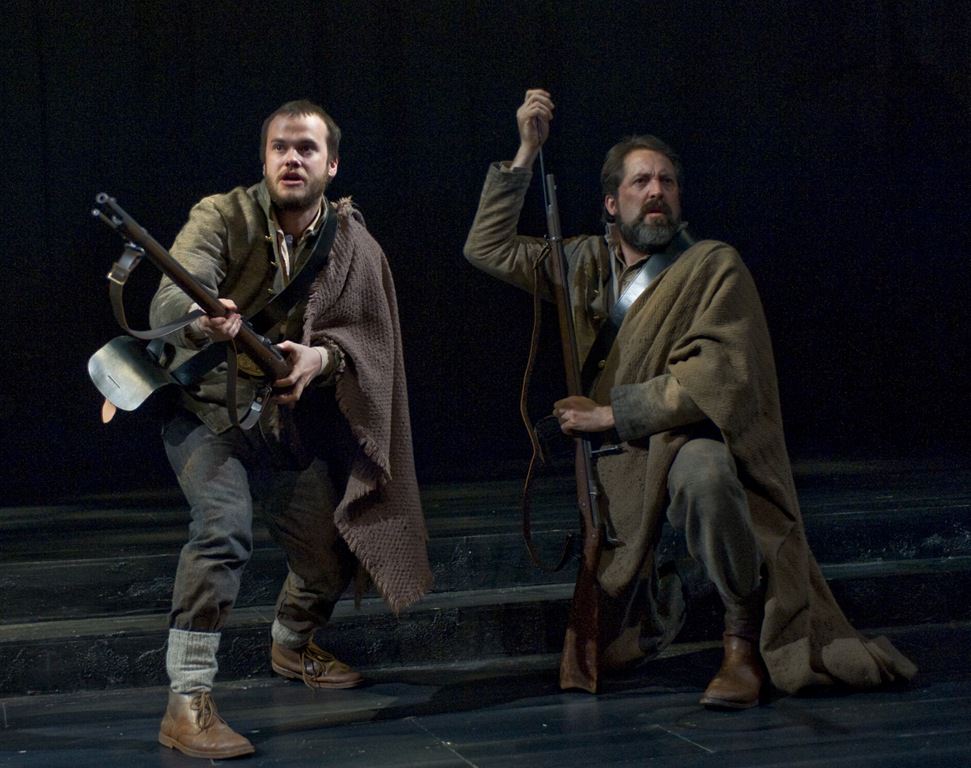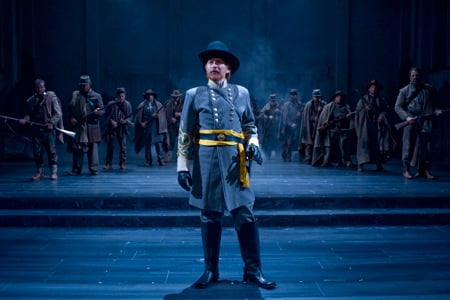The March
Adapted for the stage and directed by Frank Galati
At Steppenwolf Theatre, Chicago
A psychic destruction to follow the physical one.
Based on E.L. Doctorow’s award-winning novel of the same name, The March follows more than just General Sherman’s destructive path through the South late in the Civil War. It tells a multi-layered tale of the flotsam of people from all walks of life left decimated in its wake. While death came to many, these others must awaken to a new life, and it’s fight or flight writ large in a series of fictional tales of small people surrounding a monumental reality. While Galati’s production is faithful to the source, it can’t shed enough of the literary trappings to rise totally out of the pedantic and flesh these characters into fully sympathetic beings. It’s left to a large and stellar cast to pull these lives the rest of the way out of the page and into an important lesson from history about the less-seen nature of “total war.”
 “Uncle Billy,” (Harry Groener) as he was known to his troops, makes his appearance later than one would normally expect in a story about his march, and in unpretentious fashion at that. By then, we’ve already met some of the benefactors and victims of his march, from freed slaves to displaced Southern belles. One of the central stories surrounds two unlikely survivors, Arly (Ian Barford) and Will (Stephen Louis Grush) who recall Stephano and Trinculo or Rosencrantz and Guildenstern with their dry comic relationship of mentor and protégé morphing to each situation to wile their way to another day of life. There’s more Shakespearean overtones with several eloquent soliloquies meditating on the nature of how life has been wrenched from its moorings and set adrift on unstable waters.
“Uncle Billy,” (Harry Groener) as he was known to his troops, makes his appearance later than one would normally expect in a story about his march, and in unpretentious fashion at that. By then, we’ve already met some of the benefactors and victims of his march, from freed slaves to displaced Southern belles. One of the central stories surrounds two unlikely survivors, Arly (Ian Barford) and Will (Stephen Louis Grush) who recall Stephano and Trinculo or Rosencrantz and Guildenstern with their dry comic relationship of mentor and protégé morphing to each situation to wile their way to another day of life. There’s more Shakespearean overtones with several eloquent soliloquies meditating on the nature of how life has been wrenched from its moorings and set adrift on unstable waters.
Displaced and whirling in the miasma, most of characters takes turns in many roles to adapt to their new life. Whether trading in dresses for surgical gowns or slave rags for a uniform, each person is just trying to survive and discern how to move forward. Will and Arly steal every scene, with Arly auguring God in every action even as he entices the innocent Will into various sins and turncoated activities. Counterpointing their shenanigans is the army surgeon Dr. Sartorius (Philip R. Smith). He’s a coldly moral conscience in Sherman’s troupe, giving apt metaphor to the nature of this beast weaving its way through the continent, each soldier a mere expendable cell. Treating blue and gray coats equally and dispassionately, he forms an equally desensitized relationship with the involuntarily evicted aristocrat Emily (a sweet and plaintive Carrie Coon). She’s pained by what she sees and moved to compassion and a bitter wonderment at its enormity, and her heartbreaking attempts to reconcile herself to this new world provide some touching moments couched in her trembling Southern accent. Ex-slave Pearl (Shannon Matesky), a young former slave with a regal air and dressed as a drummer boy inadvertently becomes the General’s surrogate son, but it is not a safe harbor for the young one for long. It’s a lot of story—and this only scratches the surface (there are 26 actors in total, some in multiple roles)—so it’s a relief when Sherman commands not just his troops but the stage to remind us of the larger stakes.
The cavernous setpiece of dull gray, able to change with lightning pace to keep tract with the multitude of stories, at times swallows the intimacy of these relationships. I could easily see this being done at half scale in a smaller theatre where no seat is unable to see the brutal resolve on the faces of the young men, the anguish on the face of the women or the trepidation mingled with joy on the face of a freed slave. Groener’s Sherman stands out just as it should, bringing to life a man fascinatingly balanced between a cruel pragmaticism and a seething need for vengeance for those who brought war to his Union (he was actually sympathetic to the South’s enslavement).
 Galati’s adaptation does not entirely allow its characters to forget that they are not yet a part history without the hindsight or judgment of generations to come. They sometimes seem to read from their own diaries rather than live in the moment (though Sherman himself was an extremely prescient man certainly aware of both history and history’s eye upon him). This meta-awareness has a dampening effect on the horrors and revelations, so it’s fortunate that the cast is able to pull us past it and earn some emotion beyond what was almost a Ken Burns’ documentary (though that might not have been a bad idea under other circumstances).
Galati’s adaptation does not entirely allow its characters to forget that they are not yet a part history without the hindsight or judgment of generations to come. They sometimes seem to read from their own diaries rather than live in the moment (though Sherman himself was an extremely prescient man certainly aware of both history and history’s eye upon him). This meta-awareness has a dampening effect on the horrors and revelations, so it’s fortunate that the cast is able to pull us past it and earn some emotion beyond what was almost a Ken Burns’ documentary (though that might not have been a bad idea under other circumstances).
Even with those caveats, The March is a worthy work that falls just short of epic and well above the trite on the strength of many fine performances and a heartbreakingly elegiac moral. It’s not just the war, but the bitter realization that more than just infrastructure has been destroyed or lives lost. Bodies can be buried, cities can be rebuilt and crops replanted, but the the shell shock rightfully remains in the ears of those who take up the mantle of peace—a mournful tinnitus echoing a warning in the aftermath.
Recommended.
Review by Clint May
Date Reviewed: April 17, 2012
For more info checkout the The March page on www.steppenwolf.org
At Steppenwolf Theatre, 1650 N. Halsted, Chicago, IL; call 312.335.1650 or visit www.steppenwolf.org; tickets $20-78; performances Tuesdays through Fridays 7:30pm, Saturdays and Sundays 3pm & 7:30pm; running time 2 hours 45 minutes with one 15 minute intermission; through June 10.


